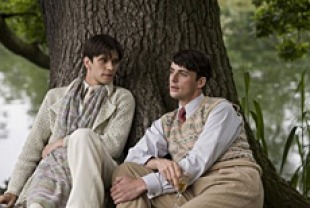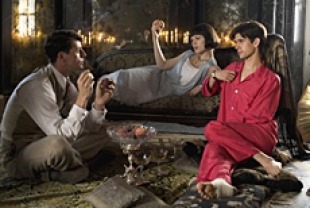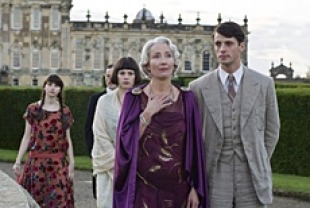In the 1920s, middle-class Charles Ryder (Matthew Goode) heads off to Oxford to study history although his main interest is art. He meets Lord Sebastian Flyte (Ben Whishaw), a dandy who is charmed by his intensity and proclivity for beauty. Charles is dazzled when his new friend takes him to "Brideshead," the family ancestral home. This splendid castle is filled with rare paintings, sculptures at every turn, and even a grand fountain. Charles is invited to spend the summer there, and he meets the other members of the family: his imperious mother Lady Marchmain (Emma Thompson), Sebastian's stuffy older brother Bridey (Ed Stoppard), and his sisters Julia (Hayley Atwell) and Cordelia (Felicity Jones). Since his emotionally chilly father doesn't evidence much interest in him, Charles is quite taken by Sebastian's relatives who all treat him kindly. He does note the domineering influence of Lady Marchmain's Catholicism on her children who have been schooled in the wages of sin and the necessity of concerning oneself with the soul instead of the flesh and seeking Heaven rather than the things of this world.
Charles accompanies Sebastian and Julia on a visit to Venice to see their hedonistic father, Lord Marchmain (Michael Gambon) and his Italian mistress Cara (Greta Scacchi). During their time together, Sebastian has fallen in love with Charles and consummated the affair with a kiss. But his friend has become infatuated with Julia, a pretty and clever young woman who has spurred him on with her flirtatious behavior. When Sebastian sees them kissing each other in secret, he is devastated. Already a heavy drinker, he descends into alcoholism.
Back in England, the relationship between Charles and Sebastian has deteriorated. Lady Marchmain has made it clear that her daughter will never marry a non-Catholic and Charles has made it clear to everyone that he is an atheist. Invited to Julia's 21st birthday ball at Brideshead, he is stunned to hear that she is engaged to Rex Mottram (Jonathan Cake), a Canadian businessman who has been approved by her mother. Unable to constrain the drunken Sebastian from spewing out his hatred for his family, Charles is banished from Brideshead by Lady Marchmain.
Brideshead Revisited is masterfully directed by Julian Jarrold (Kinky Boots, Becoming Jane). We believe it will appeal to both fans of Evelyn Waugh's 1945 novel and the 11-part BBC television series which aired in 1981. The film's sophisticated screenplay by Andrew Davies and Jeremy Brock zeroes in on the romantic triangle which brings such emotional upheaval to each of the characters. It also does a commendable job conveying the waning of an aristocratic way of life in England as the benefits of wealth and privilege were collapsing. Waugh, who converted to Catholicism in 1930, stated that the major theme of the novel was "the operation of divine grace on a group of diverse but closely connected characters." This motif certainly is evident in a critical scene when Lord Marchmain returns to Brideshead to die and is forced to make several decisions about his faith in God and his feelings about the nature of his life. But even more predominant in this version of the novel is the toxic fallout from Lady Marchmain's rigorous Catholicism of sin, sacrifice, guilt, and otherworldliness. It poisons the spirits of Sebastian and Julia so that they are incapable of self-esteem or the slightest shred of contentment. Anyone who cherishes literary drama will relish this exquisite screen version of Brideshead Revisited.
Special DVD features include deleted scenes; the filmmakers' audio commentary; and a featurette: "The World of Brideshead."


